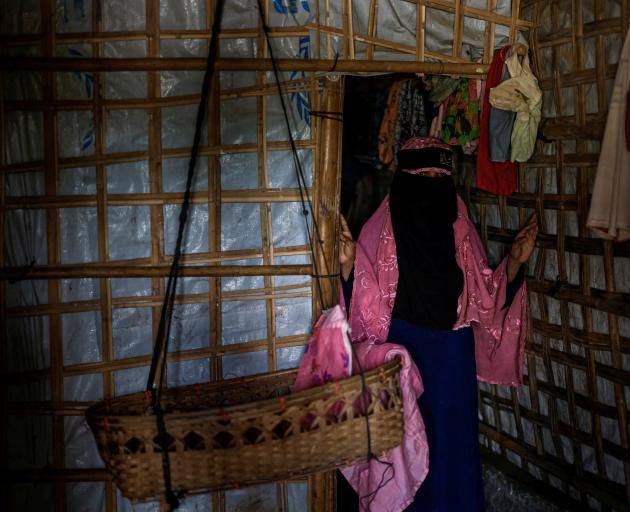Politics
Rohingya Refugee Schools Close, Threatening Children’s Futures

The closure of schools for Rohingya children in Cox’s Bazar has left over 227,500 young refugees without education, prompting concerns for their futures. This situation arises as funding for educational programs drastically declines, threatening a generation already impacted by violence and displacement.
Begum, a mother of five living in a bamboo shelter, expressed her fears about her daughters’ futures. “Without school, girls sit idle. People start talking,” said the 35-year-old, whose husband is struggling with mental health issues. Begum withheld her last name, fearing backlash for her daughter’s potential early marriage. She prays her daughter’s future husband will allow her to continue her education.
Bangladesh currently hosts approximately 1.2 million Rohingya Muslim refugees, with around half being children. Most fled a military crackdown in Myanmar, described by United Nations investigators as a “textbook example of ethnic cleansing.” The eighth anniversary of this massive displacement is marked by a sharp reduction in humanitarian aid, which has severely impacted educational services.
As the United States reduces international aid, funding for the Rohingya camps has been cut. The United Nations High Commissioner for Refugees (UNHCR) estimates it requires about $256 million for 2023 to support the displaced Rohingya, but has only secured 38% of that amount. Globally, the UNHCR anticipates receiving just a third of the $10.6 billion needed to assist a growing number of displaced individuals worldwide.
“The community has already lost everything and is now facing a severe funding shortfall that threatens their survival,” stated Juliette Murekeyisoni, the interim UNHCR Representative in Bangladesh. She highlighted the risk to essential services, including food assistance, health services, and education, warning that without immediate support, these services could collapse.
The United Nations Children’s Fund (UNICEF) suspended operations at over 4,500 schools in June, leaving many Rohingya children without access to learning. Classes resumed in July for older students, but many classrooms remain empty. “Now the kids just play in the mud or rain. They’re forgetting everything they once learned,” lamented Naser Khan, a Rohingya teacher.
In the refugee camps, countless children who once carried their notebooks have been left to wander aimlessly. Mohammed Faruq, a father of six, reflected on the impact of this educational void. “Only a little bit of education our children could learn was snatched away,” he said. “If our children cannot study, they will have no future.”
The International Rescue Committee (IRC) reports that no Rohingya child under 12 in Cox’s Bazar currently has access to education. An estimated 500,000 children are missing out on schooling. This decline in educational opportunities correlates with troubling increases in child marriage and child labor, which have risen by 3% and 7% respectively this year.
“Each day, more families will continue to turn to extreme methods of survival,” warned Hasina Rahman, the IRC’s Bangladesh director. She cited rising instances of gambling, child marriages, and forced labor as desperate responses to the ongoing crisis.
UNICEF has pointed to “shifting global priorities” as a critical reason for the decrease in funding. “To stretch every dollar, we have reduced UNICEF staff, streamlined programs, and cut costs wherever possible – but the needs far outweigh the resources available,” remarked Rana Flowers, UNICEF Representative to Bangladesh.
The funding crisis threatens to undo years of fragile progress made in the Rohingya camps. Over the past 18 months, violence in Myanmar has led to an influx of up to 150,000 new arrivals in Cox’s Bazar, further straining already limited resources.
“I dreamed my students would become doctors or engineers,” said Kafayat Ullah, a mathematics teacher. “Now, with no classes, they will become nothing.”
One young girl, Nahima Bibi, articulated the dreams of many children in the camp. “If I don’t go to school, how will I ever become a doctor?” she asked softly. Her words reflect the profound sense of loss and uncertainty permeating the lives of Rohingya children, whose futures are increasingly at risk due to the ongoing humanitarian crisis.
-

 World4 months ago
World4 months agoTest Your Knowledge: Take the Herald’s Afternoon Quiz Today
-

 Sports4 months ago
Sports4 months agoPM Faces Backlash from Fans During Netball Trophy Ceremony
-

 Lifestyle4 months ago
Lifestyle4 months agoDunedin Designers Win Top Award at Hokonui Fashion Event
-

 Entertainment4 months ago
Entertainment4 months agoExperience the Excitement of ‘Chief of War’ in Oʻahu
-

 Sports4 months ago
Sports4 months agoLiam Lawson Launches New Era for Racing Bulls with Strong Start
-

 World5 months ago
World5 months agoCoalition Forms to Preserve Māori Wards in Hawke’s Bay
-

 Health4 months ago
Health4 months agoWalking Faster Offers Major Health Benefits for Older Adults
-

 Lifestyle4 months ago
Lifestyle4 months agoDisney Fan Reveals Dress Code Tips for Park Visitors
-

 Politics4 months ago
Politics4 months agoScots Rally with Humor and Music to Protest Trump’s Visit
-

 Top Stories5 months ago
Top Stories5 months agoUK and India Finalize Trade Deal to Boost Economic Ties
-

 Health2 months ago
Health2 months agoRadio Host Jay-Jay Feeney’s Partner Secures Visa to Stay in NZ
-

 World5 months ago
World5 months agoHuntly Begins Water Pipe Flushing to Resolve Brown Water Issue









